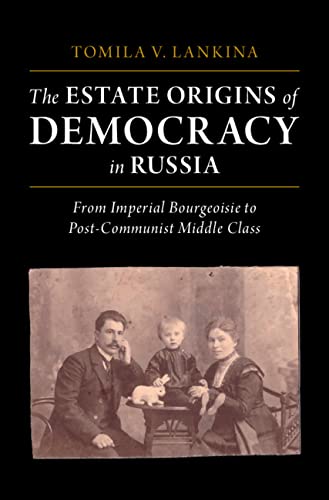
The Estate Origins of Democracy in Russia: From Imperial Bourgeoisie to Post-Communist Middle Class
Cambridge University Press, 2021.
New Book.Item #10619
ISBN: 9781316512678
Hardcover. 496 pp.
A devastating challenge to the idea of communism as a 'great leveller', this extraordinarily original, rigorous, and ambitious book debunks Marxism-inspired accounts of its equalitarian consequences. It is the first study systematically to link the genesis of the 'bourgeoisie-cum-middle class' - Imperial, Soviet, and post-communist - to Tzarist estate institutions which distinguished between nobility, clergy, the urban merchants and meshchane, and peasants. It demonstrates how the pre-communist bourgeoisie, particularly the merchant and urban commercial strata but also the high human capital aristocracy and clergy, survived and adapted in Soviet Russia. Under both Tzarism and communism, the estate system engendered an educated, autonomous bourgeoisie and professional class, along with an oppositional public sphere, and persistent social cleavages that continue to plague democratic consensus. This book also shows how the middle class, conventionally bracketed under one generic umbrella, is often two-pronged in nature - one originating among the educated estates of feudal orders, and the other fabricated as part of state-induced modernization.
'A richly textured study of historical continuities in the face of revolutionary change. Lankina's meticulous account of the pre-communist origins of Russia's post-communist society sheds new light on the logics of persistence and resilience in Russian social structure that shape political possibilities in the present day. Estate Origins is a rewarding read for anyone interested in the social requisites of democracy.'
- Bryn Rosenfeld, Assistant Professor, Department of Government, Cornell University
"This fascinating book challenges our view of the Soviet period as a rupture in Russia's historical development. The author shows that social hierarchies from the late imperial period thrived under communism and also continue to influence human capital, values, and democratic processes in Russia today. In addition to rigorous statistical evidence, she weaves in anecdotes and interviews that make her arguments more vivid and compelling. Anyone interested in historical legacies, social inequality, and democratic development needs to read this meticulously executed book."
- Volha Charnysh, Assistant Professor of Political Science, Massachusetts Institute of Technology.
Sold
See all items in
History & Historiography,
Law, Politics & Social Sciences,
Non-fiction / Нехудожественная литература
See all items by Tomila V. Lankina
